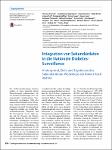Integration von Sekundärdaten in die Nationale Diabetes-Surveillance
Hintergrund, Ziele und Ergebnisse des Sekundärdaten-Workshops am Robert Koch-Institut
Schmidt, Christian
Bätzing-Feigenbaum, Jörg
Bestmann, Anja
Brinks, Ralph
Dreß, Jochen
Goffrier, Benjamin
Hagen, Bernd
Laux, Gunter
Pollmanns, Johannes
Schröder, Helmut
Stahl, Teresa
Baumert, Jens
Du, Yong
Gabrys, Lars
Heidemann, Christin
Paprott, Rebecca
Scheidt-Nave, Christa
Teti, Andrea
Ziese, Thomas
Epidemiologische Daten belegen, dass Diabetes mellitus in Deutschland wie in vielen anderen Ländern eine hohe Public-health-Relevanz hat. Am Robert Koch-Institut (RKI) wird derzeit eine Nationale Diabetes-Surveillance aufgebaut, die das Diabetesgeschehen indikatorenbasiert unter Nutzung von Primär- und Sekundärdaten kontinuierlich abbilden soll. Ziel des Workshops war es, eine Bestandsaufnahme verfügbarer Sekundärdatenquellen vorzunehmen und Dateninhalte, Datenzugänge, Analysebeispiele sowie Möglichkeiten einer verstetigten Nutzung für die Diabetes-Surveillance zu diskutieren. Epidemiological data provide evidence that diabetes mellitus is a highly relevant public health issue in Germany as in many other countries. The Robert Koch Institute (RKI) is in the process of building a national diabetes surveillance system that is aimed at establishing indicator-based public health monitoring of diabetes population dynamics using primary and secondary data. The purpose of the workshop was to conduct an inventory of available secondary data sources and to discuss data contents, data access, data analysis examples in addition to the options for ongoing data use for diabetes surveillance.
Files in this item
No license information
Related Items
Show related Items with similar Title, Author, Creator or Subject.
-
2019-06-19ZeitschriftenartikelTypes of diabetes are not limited to age groups: type 1 diabetes in adults and type 2 diabetes in children and adolescents Rosenbauer, Joachim; Neu, Andreas; Rothe, Ulrike; Seufert, Jochen; Holl, Reinhard W.Based on data from the national diabetes registry DPV (Diabetes patient documentation), the diabetes registry of North Rhine-Westphalia and surveys conducted at hospitals and practices in Baden-Württemberg and Saxony, ...
-
2017-05-03ZeitschriftenartikelLongitudinal change in health-related quality of life in people with prevalent and incident type 2 diabetes compared to diabetes-free controls Schunk, Michaela; Reitmeir, Peter; Rückert-Eheberg, Ina-Maria; Tamayo, Teresa; Schipf, Sabine; Meisinger, Christa; Peters, Annette; Scheidt-Nave, Christa; Ellert, Ute; Hartwig, Saskia; Kluttig, Alexander; Völzke, Henry; Holle, RolfObjective: The objective of this analysis is to compare people with prevalent type 2 diabetes, incident type 2 diabetes and without diabetes with respect to longitudinal change in health-related quality of life (HRQOL) ...
-
2012-05-13MasterarbeitEvaluation of the German Diabetes Risk Score as a screening tool for undiagnosed diabetes Paprott, RebeccaBackground: Regional German studies estimated the prevalence of undiagnosed diabetes to be almost as high as the prevalence of diagnosed diabetes. Even before symptoms of diabetes occur, diabetes related secondary diseases ...

